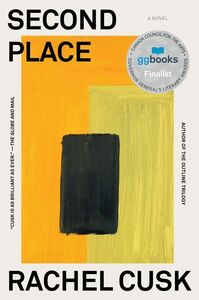Take a photo of a barcode or cover
dark
emotional
reflective
tense
slow-paced
Plot or Character Driven:
Character
Strong character development:
Complicated
Loveable characters:
No
Diverse cast of characters:
No
Flaws of characters a main focus:
Yes
I'm really surprised by how much I actually enjoyed this book, there isn't much actually happening and it's entirely told in the form of someone telling someone else about it, it shouldn't have worked so well for me but it did. There's just something about the writing and the character that drew me in and kept me reading.
after finishing this book I know it’ll take a while to collect my thoughts about it. it’s theme have danced around my mind the entire time i read it and even after i finished i feel no contentment. cusk is a brilliant writer and i look forward to reading her other books
dark
mysterious
reflective
slow-paced
Plot or Character Driven:
Character
Strong character development:
No
Loveable characters:
No
Diverse cast of characters:
No
Flaws of characters a main focus:
Yes
Second Place is about a woman invites a much adored and idealised artist to her and her husband’s home in a remote coastal region. What follows is not so much a story as it is a reflection of this woman’s hopes connected to the visit, provocations that follow and her and everyone’s struggles with the situation and questions raised by the usual constellation.
As alluded to, this is one of the books without much of a plot but rather a stream of consciousness. I usually don’t do too well with such a small number of paragraphs as well as long chapters. To my own surprise, it didn’t really bother me here, instead it felt fitting. I liked how reflections about art, morality and motherhood were woven into the story. Overall, it was quite an enjoyable and quick read for me.
If you liked this, make sure to check out “if nobody speaks of remarkable things” by Jon McGregor (or vice versa; there’s a review on my grid as well) as these two books hit a very similar spot for me.
emotional
reflective
tense
medium-paced
Plot or Character Driven:
Character
Strong character development:
Yes
Loveable characters:
Yes
Diverse cast of characters:
No
Flaws of characters a main focus:
Yes
made me hug my mom
challenging
medium-paced
Plot or Character Driven:
Character
Strong character development:
Complicated
Loveable characters:
No
Diverse cast of characters:
No
Flaws of characters a main focus:
Yes
I can't review Rachel Cusk's work. To get a perfect simulation of the universe, you must build the universe. To adequately convey my feelings about one of Cusk's books, one must live my whole life then read the book.
Update 2021-10-10: Reading one of the many articles discussing the NYT bad art friend article, I came across the following quote by Emily Flamm that explains part of why I really like reading Cusk's books, and particularly Second Place: "The viability of a friendship can seem less reliant on shared values or interests, sometimes, than whether your insecurities are compatible." The narrator in this book is sort of hollowed out in a way that resonates with me. I don't necessarily identify with all of the aspects of the character, but I really feel something for her because she taps into an important set of compatible insecurities.
Update 2 on 2021-10-12: I continue to try to understand why I find Cusk so compelling; so interesting despite her focus on experiences that I have never had. With some authors, I feel more comfortable feeling emphatically positive about them because they are simultaneously obscure enough that many people haven't heard of them yet critically acclaimed enough that I don't have to trust just my own judgement that they are good. Cusk could fall into that category, but one of the things I find compelling about her is that I don't get the sense that she was a critical darling prior to the Outline trilogy. Also, most people I talk to about books both know her work and are only lukewarm about it!
Clearly there is an element of literary innovation. That was a big part of my enjoyment of Outline. Second Place has a semi epistolary style that didn't really work for me (even though the person being addressed was named Jeffers), but I still appreciate the attempt.
More than either of these, though, it is something about the largely unearned world weariness of her narrators that I appreciate the most.
Update 2021-10-10: Reading one of the many articles discussing the NYT bad art friend article, I came across the following quote by Emily Flamm that explains part of why I really like reading Cusk's books, and particularly Second Place: "The viability of a friendship can seem less reliant on shared values or interests, sometimes, than whether your insecurities are compatible." The narrator in this book is sort of hollowed out in a way that resonates with me. I don't necessarily identify with all of the aspects of the character, but I really feel something for her because she taps into an important set of compatible insecurities.
Update 2 on 2021-10-12: I continue to try to understand why I find Cusk so compelling; so interesting despite her focus on experiences that I have never had. With some authors, I feel more comfortable feeling emphatically positive about them because they are simultaneously obscure enough that many people haven't heard of them yet critically acclaimed enough that I don't have to trust just my own judgement that they are good. Cusk could fall into that category, but one of the things I find compelling about her is that I don't get the sense that she was a critical darling prior to the Outline trilogy. Also, most people I talk to about books both know her work and are only lukewarm about it!
Clearly there is an element of literary innovation. That was a big part of my enjoyment of Outline. Second Place has a semi epistolary style that didn't really work for me (even though the person being addressed was named Jeffers), but I still appreciate the attempt.
More than either of these, though, it is something about the largely unearned world weariness of her narrators that I appreciate the most.
The prose — despite its meticulous intellect — was smooth as butter and so I was able to read this very quickly. I did find myself rereading a lot of sentences (I know these two things are contradictory but I guess the writing flowed while the thoughts didn’t always). I loved Tony and felt some far-off association with Justine. Hated everyone else! Could not stand L or M’s thoughts and actions towards him. Maybe that was the point but ultimately I did not really have a good time reading this. Finishing it did not feel in any way rewarding.
challenging
reflective
slow-paced
Plot or Character Driven:
Character
Strong character development:
Complicated
Loveable characters:
No
Diverse cast of characters:
No
Flaws of characters a main focus:
Yes
Such a strange novel, but I was totally captivated by it -- an investigation of freedom, reality and art through the lens of an unstable woman in the midst of an existential crisis. Beautifully written, so many highlighted sections




